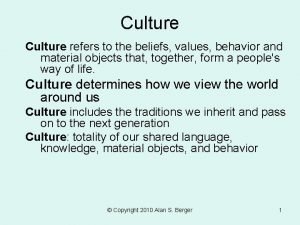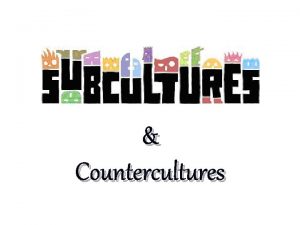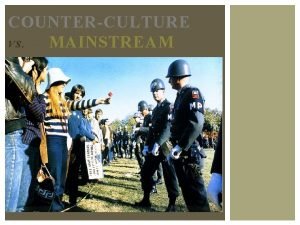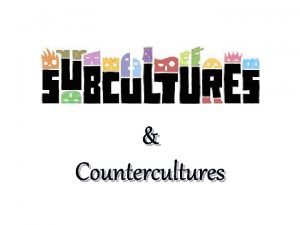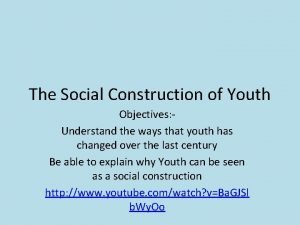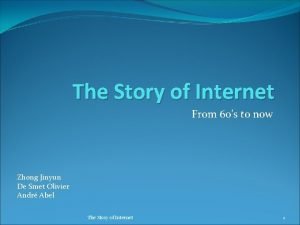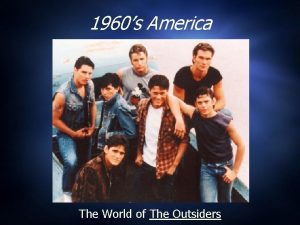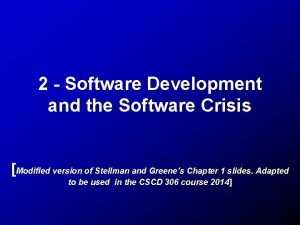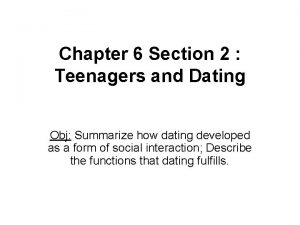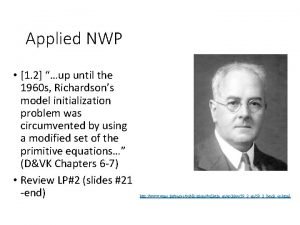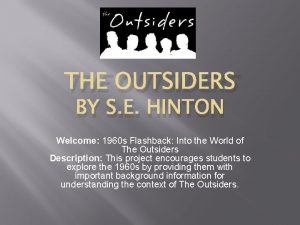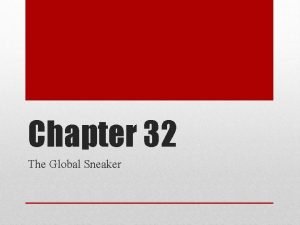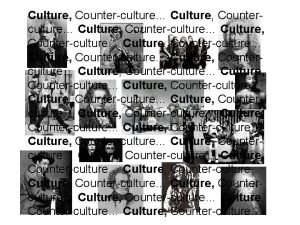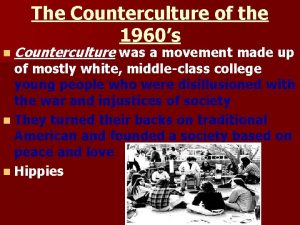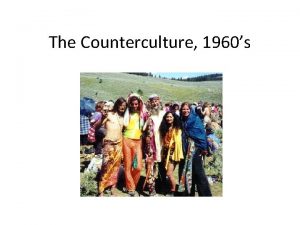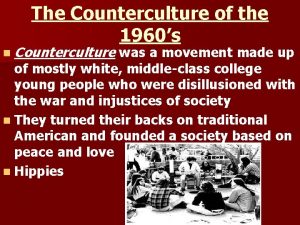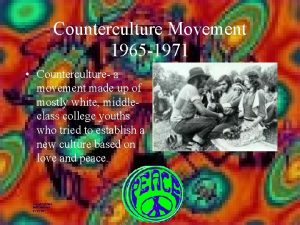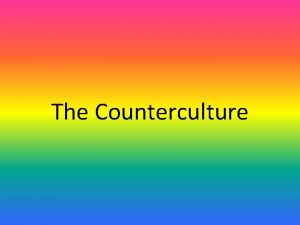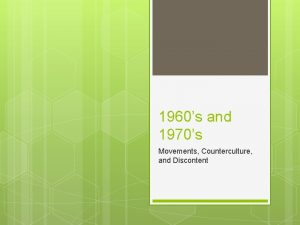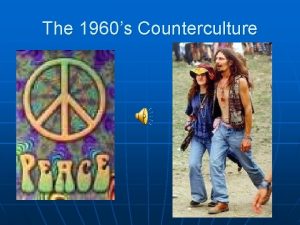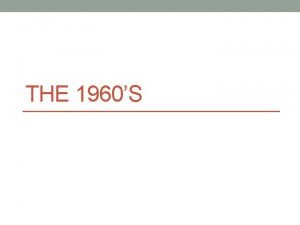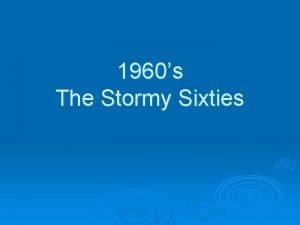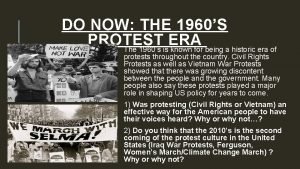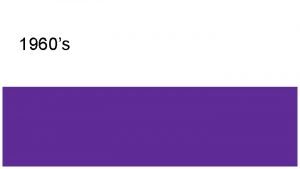Counterculture of the 1960s The Youth Culture of























- Slides: 23

Counterculture of the 1960’s

The Youth Culture of the 60’s “Baby boomers” who reached their 20’s by the 1960’s Influenced by postwar prosperity & TV Objected to corporate America & the “Establishment” Those in charge of society

New Life-Styles The Beatles A rock band from England Introduced new fashions and long hair styles for males The new youth culture experimented openly with drugs & sex Hippies Left mainstream society altogether & went to live on self-sufficient communes

Beginning of the Vietnam War 1954 -1973

Vietnam Once was a French colony in Indochina 1954 Ho Chi Minh defeated the French rulers Geneva Conference Vietnam was divided into 2 nations. North- controlled by Ho Chi Minh & communists South- controlled by Western nations Supposed to be reunited after elections in 1956

Ho Chi Minh introduced: Land reform. Break the power of the village leaders to form a new class of leaders who have no ownership of the land “Re-education”Imprisoning people from S. Vietnam to torture and abuse them S. Vietnam refused to hold elections since they would not be free in the North

Vietcong South Vietnamese Communists Supported by N. Vietnam Started a guerrilla war against the govt of S. Vietnam Assassinated officials and seized control

U. S. & the Domino Theory Belief that if S. Vietnam fell to communism, neighboring SE Asian countries would also fall to communism like a row of dominos Pres. Kennedy sent aid and U. S. military advisers to help S. Vietnam fight the Vietcong

Gulf Of Tonkin Resolution 1964 Pres. Johnson announced that the N. Vietnamese had attacked U. S. ships in international waters in the Gulf of Tonkin Congress gave him full military powers Revealed years later that the ships had been in N. Vietnamese waters

Johnson Escalates the War Ordered massive bombing raids Sent more combat troops to S. Vietnam 1968 - ½ million US soldiers were there New weapons: Napalm- a sticky gasolinebased jelly that burns Agent Orange- an herbicide that destroyed the jungle cover used by the Vietcong to hide

The Tet Offensive 1968 - Vietcong seized the capital city of S. Vietnam, Saigon American forces finally drove away the Vietcong but proved that a victory was far away Showed the American public that the Vietcong were not weak, undersupplied or disorganized like they thought

Roy Benavidez Carried wounded members of his platoon to rescue helicopters while facing enemy fire Saved 8 men Awarded the Congressional Medal of Honor by Pres. Reagan in 1981

By the end of 1968: US had dropped more bombs on Vietnam than it had in all of WWII The war was costing $25 billion a year US was unable to win because of:

1. Popularity of Ho Chi Minh He was seen as the “father” of Vietnam who was fighting for independence People were willing to suffer large losses to re-unify their country S. Vietnamese govts failed to gain popular support

2. Difficulties of Guerrilla Warfare American soldiers were not familiar with the Vietnamese language, people or physical environment Unable to tell who was friendly or the enemy Jungles were an ideal cover for Vietcong https: //www. yout ube. com/watch? v=6 gdumxfs. Tg. Q

3. The Anti-War Movement The Media Showed the destructiveness of the war Johnson promised everything was going according to plan Led to a “credibility gap” as Americans lost faith in their government. “Doves” wanted to end the war, “hawks” supported it.

Richard Nixon as President Republican Promised Americans “peace with honor” in Vietnam War dragged on for 5 more years under Nixon

th 26 Amendment Lowered the voting age to 18 During the Vietnam War, 18 year olds were old enough to be drafted, but were told they were not old enough to vote Many Americans believed this was unfair

Nixon’s Vietnamization Secretary of State Henry Kissinger worked with Nixon on the policy S. Vietnam’s army began to take over fighting U. S. began to withdraw forces Increased bombing in North and more aid for the South.

Invasion of Cambodia Nixon thought he could end the war if he created multiple routes into Vietnam through Cambodia U. S. invaded and Americans were shocked In 1970, protests and the Kent State shootings led to the closing of colleges across the nation

Nixon’s Diplomacy Nixon negotiated with China and the Soviets to encourage peace “Silent Majority” Nixon supposed that many American’s quietly supported the war Pentagon Papers Published in the NYT, the documents showed presidents before Nixon refused to end the war because defeat was a disgrace

The Fall of Saigon Through Vietnamization, U. S. troops were gradually reduced In 1973, a cease-fire was called with the North, though fighting continued In 1975, Saigon fell to the North and any remaining supporters of the U. S. were sent to “re-education camps”

The Legacy of the War Death & Destruction: 58, 000 Americans died, millions of Vietnamese killed and left homeless. Impact: Expenses ended Great Society and brought inflation. It also divided America and showed how important public opinion is to government. Limits of Pres. Power: War Powers Actrequires Pres. to inform Congress within 48 hours of troop movement, without support in 60 days, Pres. must withdraw.
 1950s conformity and counterculture
1950s conformity and counterculture Culture refers to
Culture refers to Examples of multiculturalism
Examples of multiculturalism Culture defintion
Culture defintion What is a subculture
What is a subculture Mainstream vs counterculture
Mainstream vs counterculture Vocational subculture
Vocational subculture The members of the counterculture movement were mostly
The members of the counterculture movement were mostly Counterculture in the philippines
Counterculture in the philippines Objectives of youth culture
Objectives of youth culture 1960s fashion history
1960s fashion history Software crisis of 1960s
Software crisis of 1960s Internet in the 1960s
Internet in the 1960s Ohtur
Ohtur Software crisis in software engineering
Software crisis in software engineering Dating patterns since the 1960s are
Dating patterns since the 1960s are Up until the 1960s
Up until the 1960s Car in the outsiders
Car in the outsiders S. e. hinton 1960
S. e. hinton 1960 1960 greaser
1960 greaser Designing a global sneaker
Designing a global sneaker 60s food trends
60s food trends Lawn culture method
Lawn culture method Continuous culture and batch culture
Continuous culture and batch culture

